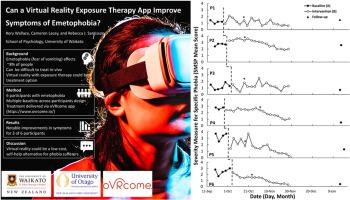虚拟现实暴露治疗应用程序能改善呕吐恐惧症的症状吗?单受试者实验设计研究
IF 2.2
4区 医学
Q3 PSYCHIATRY
Journal of Behavior Therapy and Experimental Psychiatry
Pub Date : 2025-08-23
DOI:10.1016/j.jbtep.2025.102056
引用次数: 0
摘要
呕吐恐惧症(害怕呕吐)是一种未被充分研究的疾病,它会影响。2%的人,极端(非恐惧症)恐惧影响了多达8%的人。对特定恐惧症最有效的治疗方法是暴露疗法,而虚拟现实暴露疗法(VRET)已经成为传统体内或想象暴露疗法的可行治疗选择。然而,使用VRET治疗呕吐恐惧症尚未被探索。我们采用受试者内、多基线、跨参与者设计,共6名参与者来评估overcome的呕吐恐惧症项目;在使用overrcome VRET应用程序后,我们发现六名参与者中有四名(P2, P4, P5和P6)自我报告的恐惧症症状有了明显的改善。对于一半的参与者(P4, P5和P6),报告的下降幅度很大,其中两名参与者的得分低于可能的恐惧症诊断阈值。overrcome VRET应用程序的反吐程序可能有效降低反吐的严重程度,我们的研究结果支持了电子健康应用程序可以是一系列心理问题的低成本和有效治疗方法的研究。本文章由计算机程序翻译,如有差异,请以英文原文为准。

Can a virtual reality exposure therapy app improve symptoms of Emetophobia? A single-subject Experimental design study
Emetophobia (fear of vomiting) is an understudied disorder that affects .2 % of people, with extreme (non-phobic) fear affecting up to 8 % of people. The most effective treatment for specific phobias is exposure therapy, and virtual reality exposure therapy (VRET), has become a viable treatment alternative to traditional in-vivo or imaginal exposure therapy. However, using VRET to treat emetophobia has not yet been explored. We used a within-subjects, multiple-baseline-across-participants design with six participants to evaluate the emetophobia programme of oVRcome; a low-cost, Aotearoa New Zealand-based VRET app. After using the oVRcome VRET app, we saw visible improvements in self-reported phobia symptoms for four of the six participants (P2, P4, P5, and P6). For half the participants (P4, P5, and P6), the reported decreases were large, with two participants scoring below the threshold for a likely phobia diagnosis. The emetophobia programme of the oVRcome VRET app may be effective at reducing emetophobia severity, and our results support research showing eHealth apps can be a low-cost and effective treatment for a range of psychological issues.
求助全文
通过发布文献求助,成功后即可免费获取论文全文。
去求助
来源期刊
CiteScore
3.60
自引率
5.60%
发文量
48
期刊介绍:
The publication of the book Psychotherapy by Reciprocal Inhibition (1958) by the co-founding editor of this Journal, Joseph Wolpe, marked a major change in the understanding and treatment of mental disorders. The book used principles from empirical behavioral science to explain psychopathological phenomena and the resulting explanations were critically tested and used to derive effective treatments. The second half of the 20th century saw this rigorous scientific approach come to fruition. Experimental approaches to psychopathology, in particular those used to test conditioning theories and cognitive theories, have steadily expanded, and experimental analysis of processes characterising and maintaining mental disorders have become an established research area.

 求助内容:
求助内容: 应助结果提醒方式:
应助结果提醒方式:


